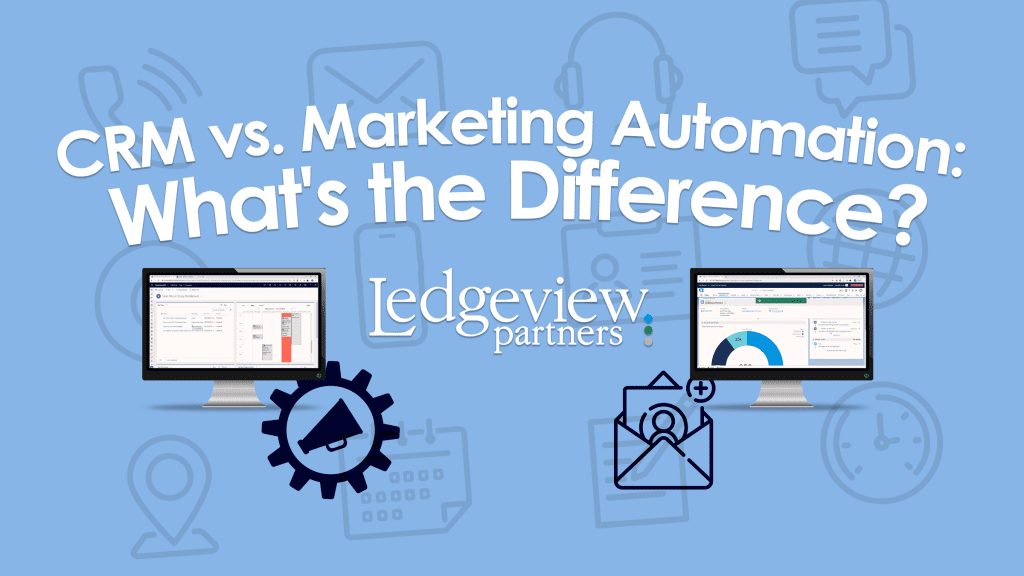While CRM and marketing automation seem similar, there are key differences between the two types of software.
What is CRM?
Across the whole sales funnel, from marketing to customer service encounters, CRM software, sometimes known as CRM, is a tool that manages contacts and sales, agent productivity, and client connections.
The length of time a customer has been a customer, a record of purchases they’ve made, and notes from phone calls are all stored in a CRM. A CRM may be used to enhance customer contacts, boost sales and customer happiness, and simplify procedures. (Related reading: Selecting CRM Software)
A CRM is accessible to practically everyone in your company and saves all departmental data in a single, convenient location.
How do CRM functions work?
Along social media, email, or your company’s website, a CRM tracks the activities of current and future customers, gathers information, and guides each interaction through a customer journey, such as by sending a prompted email or informing a staff member of the customer’s interest.
What advantages can CRM programs offer?
Utilizing a CRM system has a number of advantages that may eventually save your company time and money. Your chances of turning leads into clients can also be improved with a CRM. The following are some of the main advantages of utilising a CRM platform:
Organization
After you provide basic details like a phone number, name, and email address, a CRM will automatically monitor and arrange your contacts. This is one of the main advantages of a CRM. The CRM acts as a single store of data that every employee in your company can utilise to enhance customer service and increase lead generation for the company.
task monitoring
By automating time-consuming operations, a CRM may also integrate your business’ standard workflow and save your workers’ time on routine chores. By making it simpler to distribute frequent, customised communications, it may also increase client engagement.
increased chances for sales
A CRM keeps track of your existing customers’ purchasing habits and offers insight into themes and trends that you may use to create marketing and lead generation strategies with a better likelihood of bringing in fresh leads and clients.
monitoring the growth of sales in one place
You may readily identify areas that need improvement by tracking client journeys, filling in the gaps, and allocating leads to sales representatives with a CRM system.
individual communication
The majority of CRM software also provide you the ability to personalise your communications to customers, which has been shown to enhance lead conversion. In fact, according to Infosys study, 86% of customers said that personalisation influences their purchase choices. You may personalise emails using clients’ names, focus campaigns based on their purchasing patterns, or send emails based on the stage of the customer journey.
A few CRM system examples
The most prevalent CRM platforms are listed below:
Salesforce
Salesforce is a CRM-focused provider of software as a service (SaaS) for the cloud. The platform enables seamless collaboration across your marketing, sales, commerce, service, and IT departments via the company’s Customer 360 application.
HubSpot
HubSpot is a free CRM platform that delivers up to 1 million contacts, transaction monitoring, corporate analytics, and real-time updates on your sales funnel via a virtual dashboard.
Freshworks
Freshworks offers a consolidated, 360-degree picture of consumers, targeted messaging, phone, email, and activity recording, all powered by artificial intelligence.
Pipedrive
In addition to lead management, communication tracking, automation, and a mobile app for managing your contacts from anywhere, Pipedrive is a user-friendly CRM. A 14-day free trial is available from the firm.
What is Marketing automation?
Segmentation, lead generation, capture and nurturing, relationship marketing, client retention, and account-based marketing are just a few of the essential marketing operations and workflows that may be streamlined, analysed, and automated using a system called marketing automation. Marketing automation is primarily used to streamline procedures, get rid of time-consuming duties, and generate customised, focused marketing campaigns for your clients. [Read related article: Buyer’s Guide for Marketing Automation]
By enabling you to nurture leads with personalised content, marketing automation enables your company to concentrate on providing superior client experiences. It may be used to boost output, monitor and improve customer interaction, turn leads into clients, qualify leads, and improve workflow efficiency for your business.
How exactly does marketing automation operate?
Marketing automation functions as its name indicates by automating essential marketing processes. The purpose of the programme is to free up resources in your company, saving it time and money while enabling you to investigate more effective targeting techniques.
The four key parts of marketing automation software are as follows:
central database for marketing. All information on potential leads, client interactions, and user activity is kept and evaluated here.
engine for engagement marketing. Your marketing processes are created, managed, and automated here.
analytics software. As the name implies, here is where you test, measure, and optimise the effects of your marketing campaigns on revenue as well as identify areas for improvement.
stack of marketing technology. The term “marketing technology stack,” or “martech stack,” refers to a group of any additional programmes you may utilise, such as SaaS platforms, social media tools, and content management systems, to achieve your marketing objectives.
What advantages does marketing automation offer?
For your business, marketing automation may offer a wide range of advantages, such as the following:
higher rates of conversion
By guaranteeing that only clients who are interested in your business see your material and by assisting you in creating relevant and compelling content, marketing automation software may help you increase your conversion rates.
improved efficiency
By assigning and monitoring tasks, alerting team members, automating schedules, and enabling simple inter-team communication, marketing automation software helps identify issues in your workflows and streamline operations.
A rise in productivity
The basic goal of marketing automation software is to automate as many of your employees’ repetitive jobs as possible so they may focus their time on other, more crucial responsibilities. By simplifying employees’ tasks, automation can even increase employee happiness and engagement.
Personalized shopping experience
Marketing automation software can assist you in making sure that all of your marketing content is tailored to each individual customer by gathering customer information, examining user behaviour, and capturing data that can be used in marketing campaigns. Personalized, targeted content is an excellent way to attract new customers and keep existing ones.
superior quality leads
Not always is it beneficial to have more leads. Concentrate on quality rather than quantity since high-quality leads are more likely to become devoted consumers. Marketing automation software enables you to find the leads that are most likely to convert by using a special lead scoring methodology.
Examples of marketing automation
Here are a few well-known makers of marketing automation software:
366 Degrees 366 Degrees is a supplier of marketing automation software that combines sales automation with CRM integration to provide an intuitive, all-in-one marketing tool. Businesses may construct social media, email, and video marketing campaigns with the programme.
Marketo Marketo gives you the ability to design and scale automated marketing campaigns, interact with the appropriate consumers through behaviour tracking, and assess the impact of your marketing channels on revenue.
Autopilot
With a 30-day free trial, lead collection and conversion, tailored messaging, and specially created customer experiences among its main features, Autopilot delivers a visual perspective on marketing automation software.
How marketing automation and CRM interact
Although CRM and marketing automation software are two distinct systems with distinct uses, they are frequently used together to leverage their advantages and combine their capabilities.
According to Lacy Summers, chief marketing officer at Crush the PM Exam, “marketing automation gives your CRM the specific information it needs to deliver all organizational units relevant insight into existing and future consumers, what they want, what they don’t want, and how to provide them.”
You must first comprehend the distinctions between CRM and marketing automation in order to comprehend how they interact. While marketing automation is mostly utilized as a lead-generating and nurturing tool, CRM is primarily used as a sales tool. As a result, combining them enables you to:
Prior to forwarding a lead to sales, establish a connection.
Run closed-loop reporting to get a complete view of what is and isn’t functioning.
Calculate lead scores
Give leads a seamless transition from site visitor to the client to help sales representatives understand the complete lead experience with your business
Consistently communicate with leads to nurture and support them
How to combine marketing automation with CRM software
You must ensure that your CRM and marketing automation tools are correctly aligned and achieving your objectives in order to obtain the greatest outcomes from their connection. Four suggestions for combining your CRM and marketing automation solutions are provided below:
Personalize the messaging you use in sales and marketing.
You can target your audience and guarantee lead conversion by using a CRM and marketing automation software together to customise your messaging from the start. For instance, your CRM will provide demographic data to your marketing automation solution, which may free up your staff from a number of time-consuming chores. Then, your marketing department may utilise this data to focus promotions and paid advertising.
Decide on lead scoring.
According to research, a lead’s likelihood of becoming a client increases with the speed of the answer. By using the platforms to identify the people who are most valuable to your business and most likely to convert, lead scoring via your CRM and marketing automation may help make the process quicker and more effective. These leads can then be sent personalised marketing materials.
Get rid of duplicates.
It’s crucial to check that your marketing automation and CRM software are not duplicating responsibilities, since this may leave consumers angry and overburdened. While combining your marketing automation and CRM software might result in consolidated data and simple access, it can also result in unintentional repetitions of activities, such as inputting a customer’s information twice. Duplicates can irritate consumers, generate erroneous reporting or compliance problems, and can even result in difficulties, so be sure to constantly check your system for them.
Be ready to modify your procedures.
Once you’ve originally integrated your two systems, issues might develop later. Make a strategy for how you’ll quickly and affordably discover, execute, and optimise changes to your marketing and sales strategies as they relate to the software integration.
CRMs with marketing automation, as an example
The following companies all provide systems with both CRM and marketing automation features, so if you’re looking for a platform that offers the best of both worlds, take them into consideration:
HubSpot
A free, all-in-one platform called HubSpot provides powerful CRM and marketing automation features divided into four main hubs: marketing, sales, service, and content management systems. In order to fully utilise their capabilities and handle all marketing-related duties from one single spot, HubSpot advises consumers to use all four hubs simultaneously.
Moosend
An all-in-one marketing platform called Moosend is made to expand and scale along with your company. The system comes with a content editor, a CRM, marketing automation, reporting, and an email marketing tool with a tonne of features.
Rejoiner
An email marketing platform called Rejoiner provides CRM, marketing automation, list discovery and growth, data consolidation, and other services. User-based triggers, customer data centralization, and information segmentation are all made simple with Rejoiner.







